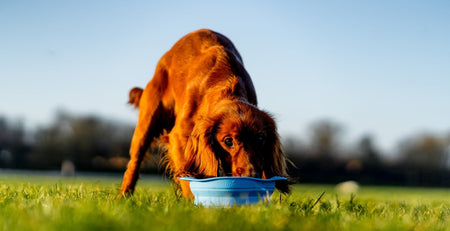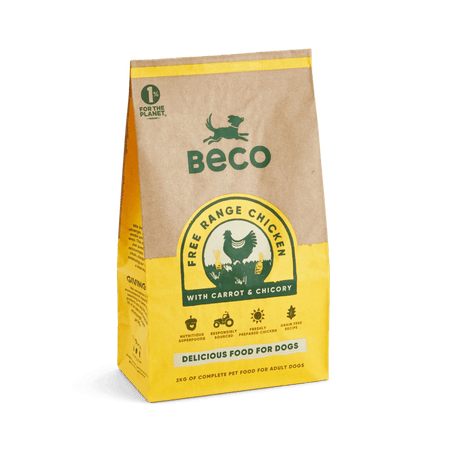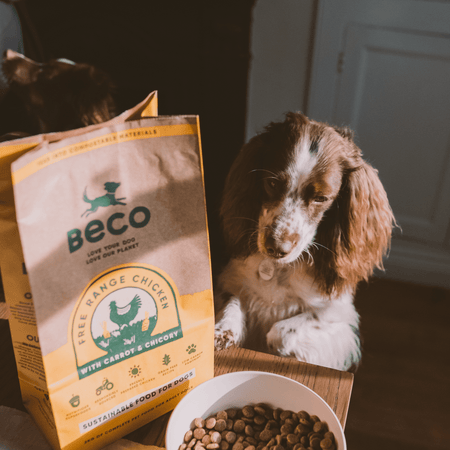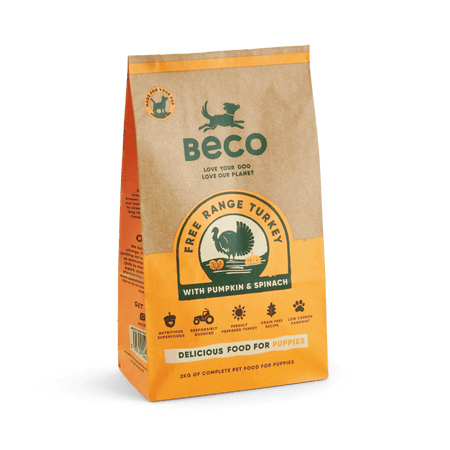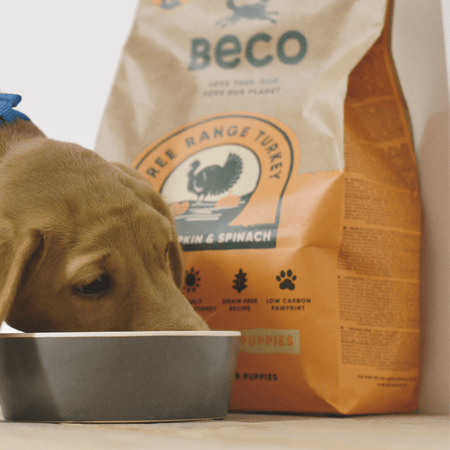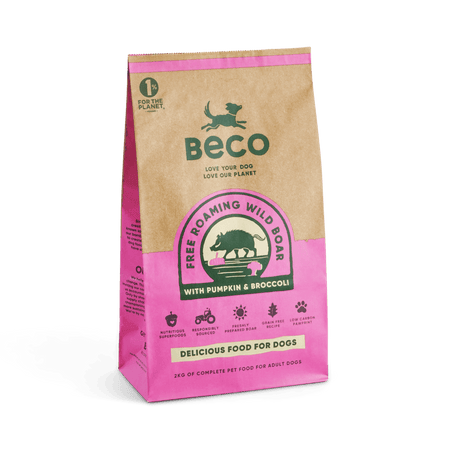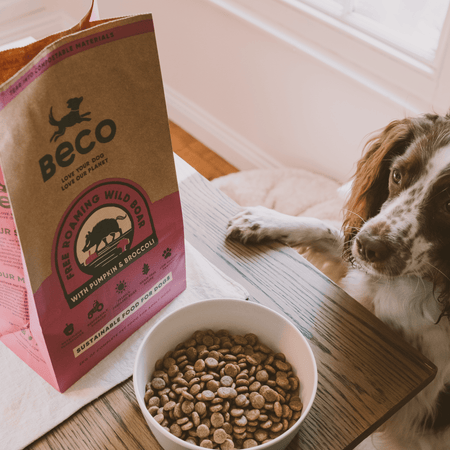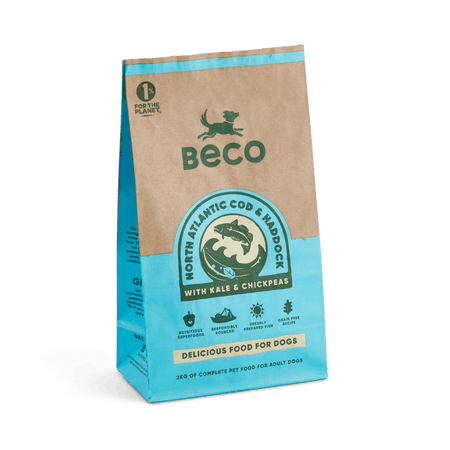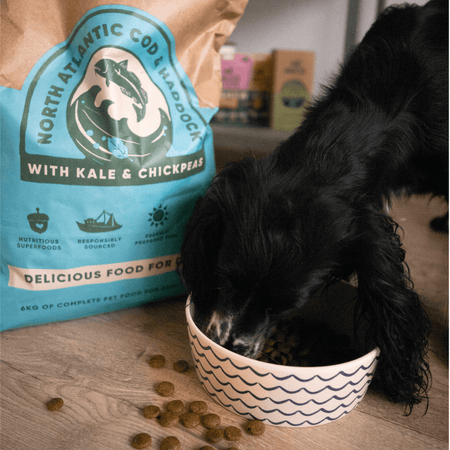Let’s get straight to the point. Dogs don’t need meat to meet their nutritional requirements and can survive on a vegan diet.
However, that doesn’t mean that it’s safe to simply replace your dog’s usual meaty treats with a vegetable-based equivalent. If your dog is going to be healthy on a vegan diet, you’ll need to pay careful attention to their nutritional needs.
It’s important to note that the restrictive nature of a vegan diet may make it a threat to the wellbeing of certain dogs. So, before moving your dog onto a vegan diet, you’ll need to consider whether their age and health means a plant-based diet is suitable for them.
A lack of studies in this area means we also can’t be sure of the long-term effects of veganism on dogs. It’s important to consult your vet before making dramatic changes such as these to your pet’s diet.
In this post we’ll be discussing – with help from Beco’s resident vet, Dr Madi Hewitson, MRCVS – the advantages and potential pit falls of feeding a vegan diet to your dog. For those owners not ready to transition their dog to a vegan diet, we’ll also cover some simple ways to reduce your dog’s carbon pawprint.
We’ll be answering the following:
Does my dog need meat?
Why feed my dog a vegan diet?
What are the benefits of a vegan diet for dogs?
Why is veganism bad for dogs?
Is a vegan diet good for puppies?
Can I feed my dog a home cooked vegan diet?
Can my cat be fed a vegan diet?
How can I reduce my dog’s carbon pawprint?

Does my dog need meat?
Unlike their wolf ancestors who survived almost entirely on meat, domestic dogs are omnivores.
As our vet Madi the vet explains: “Around 7000 years ago, the digestive systems of some wolves evolved to produce amylase, the enzyme used to digest carbohydrates. That’s why domestic dogs can digest starch”.
Despite these adaptations, many dogs still benefit from avoiding processed grains and sticking to a grain-free diet. What they can’t do without, however, is protein.
Protein is important because it contains amino acids, which are essential for your dog’s body to function normally.
Dogs need 22 amino acids. They can produce 12 themselves, leaving 10 essential amino they need to get from the food they eat.
The function of protein in dogs includes:
Growing and maintaining healthy cells, antibodies, hormones, tissues, and organs
Maintaining muscle mass
Supporting the immune system
Repairing tissue – such as skin, muscle, bone, and hair – damage and helping them heal better
These 22 amino acids can be found in both plant and animal protein sources. However, while high-quality animal-source proteins contain all the essential amino acids your dog needs, some plant-based proteins may be deficient in certain essential amino acids.
That means that, while not impossible, getting the right balance of these amino acids is trickier eating only plant-based foods.
If you’re looking to feed your dog a vegan diet, opt for commercially produced “complete” foods, which contain all the amino acids your pup needs to function properly.
Why feed my dog a vegan diet?
Health, climate change and animal welfare are just some of the reasons why people are increasingly choosing to go vegan. It’s for these same reasons that more owners than ever are looking to feed their dogs a vegan diet.
Pet ownership is carbon intensive. That’s because producing enough food to supply their meat-heavy diets requires vast amounts of natural resources. According to studies, pets produce the equivalent of about 64 million tons of carbon dioxide a year, which has about the same climate impact as a year’s worth of driving from 13.6 million cars.
Broken down in CO2 output per dog, this means an average-size dog creates around 770 kg of CO2e per year. A large dog produces a whopping 2,500kg of CO2e per year.
Thanks to researchers at Oxford University, we know that avoiding animal products can reduce your carbon footprint from food by nearly three-quarters. This means that, although a vegan diet might not always be ideal when it comes to the health of your dog, it certainly will reduce its impact on the planet.
For pet parents wanting to reduce their dogs’ environmental impact food without going vegan, why not look to insect-based “complete” products like cricket kibble. Dubbed “the wonder protein of the future”, crickets are a complete protein and are more eco-friendly than animals as farming them requires less water and land.
What are the benefits?
In humans, the claimed health benefits of veganism range from improved mood to lower cholesterol and a reduced risk of some cancers.
We don’t yet know if the same is true for dogs. However, for dogs with particularly sensitive stomachs or certain allergies, a vegan diet (given with support from a vet) can have certain benefits.
That’s because, aside from grain and gluten intolerances, the most frequently reported food allergies in dogs are animal proteins, such as chicken, beef, dairy, and egg.
Your dog may be suffering with protein allergies if they often chew on their tail and paws, have symptoms such as sensitive skin, including a dry, dull coat, and/or digestive problems. For your precious pup, failing to deal with the cause of these symptoms can lead to long-term health problems and a compromised immune system.
Going vegan is not the only way to manage these types of allergies, however. Dogs are not born with these protein allergies and instead develop them over time as they are fed the same meats repeatedly. This means switching to hypoallergenic food (this is food that uses unique proteins such as boar your dog is less likely to be allergic to) may be the less extreme option.
If this diet swap fails, ditching the meat might be essential. Just be sure to consult with your vet before you take the vegan route.
Why could veganism be bad for dogs?
Veganism is not necessarily bad for dogs, but experts agree that it is easy to get the nutrient balance in a plant-based diet wrong.
Depending on a dog’s age and activity level, an adult dog’s diet should consist of around 15-30% protein. Inadequate protein intake can lead to these deficiencies
Vitamin and Mineral deficiency:
A lack of the right amino acids can lead to serious heart problems.
Amino acid imbalance:
Dogs need vitamin B, calcium, phosphorus, and iron, which are most easily absorbed from meat sources. Vitamin B12, for example, supports a dog’s healthy nerve, cell and brain function. A lack of it can lead to excessive tiredness, loss of appetite, rapid weight loss, and even seizures.
These deficiencies can be avoided through careful supplementation. However, even taking supplements doesn’t necessarily prevent a vegan diet having serious health implications for your dog in the future.
As our vet makes clear: “We now know animal proteins are not required for a healthy diet and life in humans. But we do not yet have the necessary research to confirm whether this is the case for dogs. This means that, right now, we cannot guarantee the long-term effect of a vegan diet on canine health”.
Is a vegan diet good for puppies?
Like with dogs, a puppy can technically live on a vegan diet. However, if you’re asking, “Is a vegan diet good for puppies?” Then that’s a whole different matter.
It’s important to remember that puppies require a very specific diet containing the right sort of nutrients to support their rapidly growing frames.
Along with the right balance of require fat, calcium, and digestible carbohydrates, they need extra dietary protein while they grow and develop. Feeding your puppy the wrong sort of foods, including adult food, can lead to lifelong skeletal issues, such as hip dysplasia.
If you want to raise a vegan puppy, you’ll have to manage their diet very carefully. Given that their health is at stake, you may not want to take the risk.
The same goes for older dogs. As dogs get older, they need more protein in their diet to help them maintain their ideal body condition, which may make a vegan diet inappropriate – or even dangerous – for them.
Can I feed my dog a home cooked vegan diet?
Unless you are under the guidance and supervision of a qualified veterinary nutritionist, it’s best not to attempt to home cook vegan meals for your dog. Getting the nutritional balance right is important with a vegan dog diet – getting it wrong may cause either deficiencies, or an excess of certain nutrients.
“Unfortunately, most home-made diets for dogs are not balanced. In fact, independent studies of almost 300 different recipes found that all but 5% were deficient in at least one nutrient and around 60% profoundly deficient in many nutrients,” our vet explains.
“This is worrying and shows just how difficult it is to achieve a balanced diet at home without help from a board-certified animal nutritionist.”
Want to find a nutrition specialist? Madi suggests visiting the "European Board of Veterinary Specialists”.
Can my cat be fed a vegan diet?
Unlike dogs, putting your kitty on a vegan diet is an absolute no go if you want them to stay healthy. Cats are obligate carnivores, meaning they must eat meat to survive.
How can I reduce my dog’s carbon pawprint?
Want to reduce your pup’s impact on the planet but not ready to go vegan? Then here are some helpful top tips from our vet:
Feed treats that are plant-based
Try a vegetarian diet for your pet
Feed a less carbon intensive protein source: cow> sheep> pig> chicken> fish> insect
Lose the meat one day a week
Get rid of those extra pounds! When it comes to pet diets and increased carbon emissions, overconsumption of food leading to canine obesity is a large contributor in the western world. Cut back on the treats and you’ll have a healthier dog and a healthier planet.
As we’ve established, a vegan diet for dogs is much kinder to the planet. But is it better for their health? As our vet has explained, that’s still up for debate.
Of course, like with grains and gluten, some dogs may need to avoid animal proteins due to allergies. However, the health of some dogs, such as puppies and older dogs, might be compromised without the protein and nutrients meat.
As always, when it comes to making changes to your dog’s diet, their health requirements should come first.
Thinking of putting your dog on a vegan diet? It’s best to seek advice from your veterinarian beforehand as they can tell you if it is appropriate, supervise the transition and advise on any supplementation.




